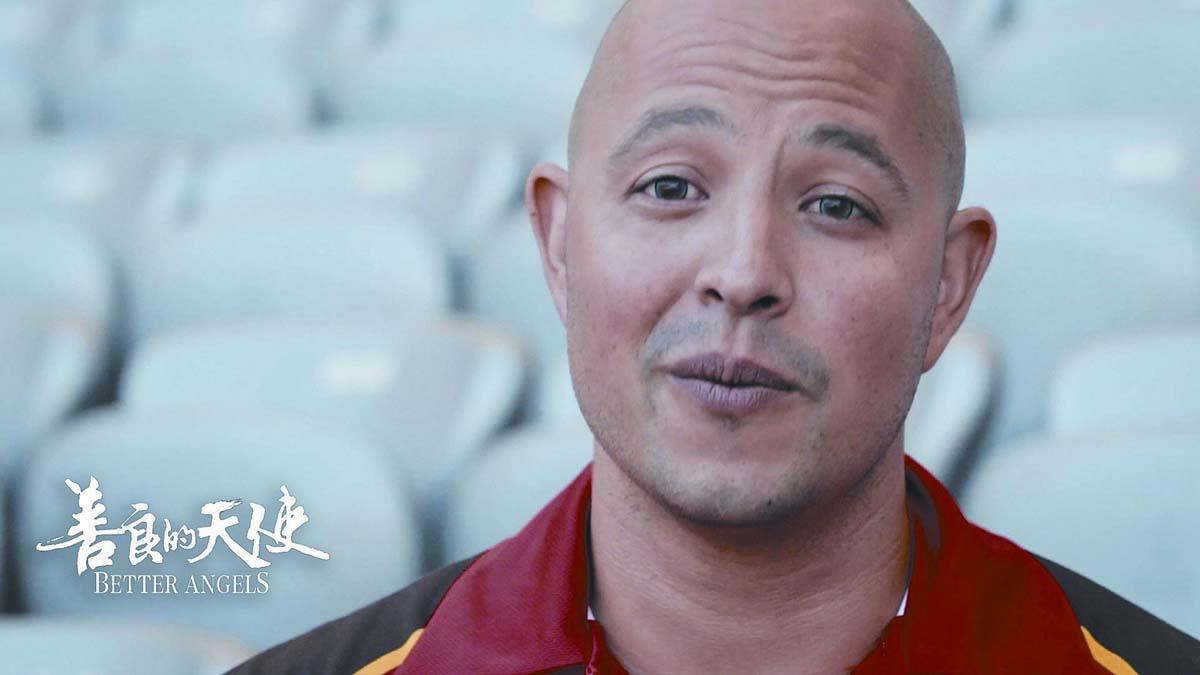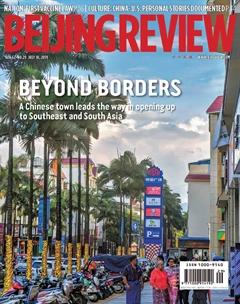Accidental Diplomats
By Li Nan

Guillermo Memo Mata realized a childhood dream in China. The former U.S. marine founded and coached Chinas fi rst juvenile tackle football team in Shanghai, east China. Teaching Chinese kids how to play U.S. football helps Mata stay grounded thousands of miles away from home.
Li Mianjun, founder of Beijing-based Shenmo Education, which specializes in mental math, introduces Chinese abacus calculations to kids in a small neighborhood school in South Central Los Angeles, making the wonder of the ancient calculating tool known to more people on the other side of the Pacifi c.
Though the two specialize in different fi elds, they have one thing in common: bridging different cultures on their own. They are accidental diplomats, who fi nd ways to get along by simply getting to know their counterparts half the world away, according to documentary maker Malcolm Clarke, a two-time Academy Award winner.
Information deficit
Better Angels, Clarkes documentary focus- ing on China-U.S. ties, was released in China recently. Its a fi lm about ordinary people from China and the U.S. who are extraordinary in their efforts to communicate with and understand each other. Teachers, engineers, farmers, workers, travelers, entrepreneurs and scholars from both countries share their stories and opinions.
“Our idea simply was to explain China to America and America to China,” Clarke told Beijing Review.
The documentary gets its title from former U.S. President Abraham Lincolns inaugural address as he took the oath of offi ce in 1861. Addressing the national turmoil of secession, Lincoln said, “ The mystic chords of memory, stretching from every battlefi eld and patriot grave to every living heart and hearthstone all over this broad land, will yet swell the chorus of the Union, when again touched, as surely they will be, by the better angels of our nature.”
Clarke thinks there is a huge information deficit between the U.S. and China. “The Chinese people, I think, really do understand more about the U.S. than the U.S. understands about China,” he said. “Americans really dont understand ordinary Chinese people.” And because of the information deficit, “they fear China,” a colossal economy with nearly 1.4 billion people. When theres fear, theres also anxiety and possibly confl ict, he added.
As a result, Clarke decided to make an anthropological film to bridge the information defi cit.
The fi lm was started in 2013 and was supposed to be finished within 18 months. But it took Clarke six years due to changes in plans and circumstances.
In 2016, when the film was first finished, Donald Trump became the new U.S. president.“That presented a whole new set of circumstances,” Clarke said, “So we had to remake our movie.” More than 800 hours of footage was fi lmed, and only 10 percent of that was used in the fi lm. “It was not an easy task,” he said.
But the effort paid off. Better Angels stood out among the 200-odd documentaries at the Ninth Beijing International Film Festival in April and won a Special Recommendation Award from the jury in the documentary category. According to William Mundell, an economist, China expert and producer of Better Angels, the movie trailer received over 3 million views on Facebook.
Extraordinary ordinary people
Clarke fi rst came to China in 1980 when it was still a rural country. He witnessed fi rsthand how China has transformed in the past four decades.
In the first six months of making the film, he interviewed experts, technocrats, politicians, journalists and academics. Then he changed his mind. “I saw what a terrible film this was likely to be,” he said. “I decided to make a fi lm which was about ordinary Chinese and Americans. We tried to explain a little bit about ordinary people and their hopes, their fears, their challenges, their diffi culties.”
To film more stories of extraordinary ordinary people, Clarke interviewed people living not only in China and the U.S., but also those working in Africa. Bao Wangli is one of them. Baos sequence always has an impact on Clarke even though he has seen it 150 times.
Bao became a engineer in his 20s, building a bridge in the headwaters of the Blue Nile in Ethiopia. Its an isolated place miles away from city lights and thousands of miles away from his wife and newborn child back in China. He accepted a three-year contract to make more money to support his family. He can make only one telephone call every week using his cellphone on a bridge, where he can get a signal.
“When I see the guy making a telephone call to his wife on Chinese New Year, you can tell that they love each other. And yet they are still allowing themselves to sacrifice this love and [endure this] loss because its for the betterment of their family,” Clarke said.
To him, Bao is emblematic of how China has become so big and successful so quickly.“That guy is a symbol of all the sacrifi ces that so many Chinese people have made over the last 30 or 40 years in turning their country around. So many people have given a lot more than most Westerners would allow themselves to give,” he said. “And I think its probably the essence of what Better Angels is all about.”
Gu Changwei, a renowned Chinese director, burst into tears while watching Better Angels.“Its very diffi cult to make a touching documentary. But Better Angels made it!”
When the film was screened in the U.S. last year, Cui Tiankai, Chinese Ambassador to the U.S., spoke highly of it. Despite the trade friction between China and the U.S., better angels are always there, no matter rain or shine, Cui said. “Extraordinary ordinary people from both sides have tried their best to pave the way for Sino-U.S. ties.”
‘The West Doesnt Give China Enough Credit
Malcolm Clarke, a two-time Academy Award winner
What Ive observed over the last six years is that my Chinese friends and my American friends are much more similar than they are different. And the Americans work really hard. They are very original and theyre very innovative and they dont take many vacations. You can just as easily say that about the Chinese. I mean if theres a nation that works harder than the Chinese, I dont know it.
I dont think China is an imperial power. The Chinese have people stationed all over the world, but they dont have troops. They dont have arms. They dont have soldiers stationed all over the world, like America; the people that China is sending abroad are engineers, scientists, bridge builders, road builders, architects. Its a different kind of global power. And I think that is only to be applauded.
I think the Belt and Road Initiative, if it can really gain acceptance, could be world changing. And I think thats a perfect example of how China is not an imperial power, but it is a global power. [In that way, they are] very, very different.
And I do feel strongly that the world can benefi t from having two strong economic super powers. I think if they can work together, it can only be good for everyone on the planet.
We have a character in the fi lm. His name is Stephen Schwarzman [American businessman and philanthropist]. And he says something very smart. He said, “The perception of China in the West is that, we, in the West, think China is rich; They, the Chinese, think China is poor. And in a sense were both right.”
Im doing this interview in Shanghai. Look out of the windows of this offi ce and you see the future. You see a city that really is in the vanguard of the most advanced cities on the planet.
And yet I know if I travel 150 miles or 150 km from this city, I can see poverty. I can see rural circumstances where people are barely eking out a living. So China is a developing country. Its not rich, its not poor, some people are rich, and many people are poor.
Every country has problems that they have to face. China has things that need to be addressed just like every other country in the world.
But I feel that we in the West really dont give China enough credit for the achievements that it has brought and given to its people over the last 30 or 40 years. Dont forget, it took America 200 years to get to where it is today. Its taken China 40 years to get to where it is.

